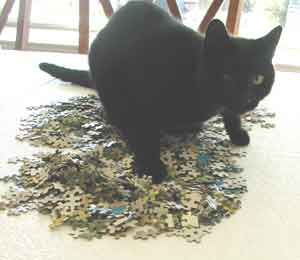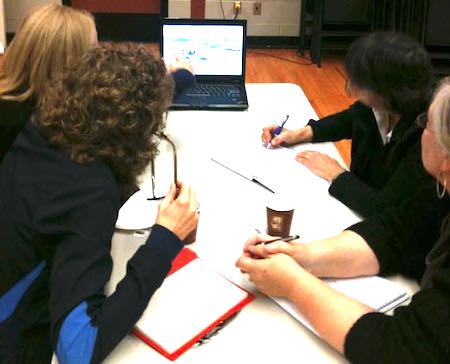Order McKenzie books online with a credit card
Bring Jamie to your school or district for a great workshop
November Issue
Vol 29|No 2|November 2018
|
Questioning: The Real Technology
By Jamie McKenzie (about author) 
Way back in 1995, Clifford Stoll published "Silicon Snake Oil: Second Thoughts on the Information Highway." He was deeply skeptical about what was happening and what was coming. Twenty-three years later, we can still identify a mixed bag of results thanks to our devices, as I outlined in September's FNO article "Looking Back and Looking Forward." During those decades I have argued that questioning may be the most powerful technology of all. Note the article "Questioning as Technology" first published in 2002. The point deserves mentioning again as we approach 2020. The words I wrote in 2002 ring true sixteen years later:
Sixteen years later, I don't see that all that much has changed, sadly. Bloom's Taxonomy and Questioning For decades before and after the arrival of computers, many teachers and educational leaders have been trying to lift the bar when it comes to classroom learning activities, often pointing to Bloom's Taxonomy as a way to judge the level of thinking involved. Sadly, in many classrooms there is more shoveling than thinking.
To master the top three most demanding levels of Bloom's (cognitive) Taxonomy -- Evaluation, Synthesis and Analiysis -- a student must have exceptionally sharp questioning skills, yet it is rare to find a school that has devoted resources to make sure all teachers possess those skills and know how to share them with their students. While there have been serious attempts to lift the bar in the USA to meet the demands of the Core Standards, those attempts have not produced impressive results. Most teachers have passed through pre-service training that does little to equip them to impart these thinking and questioning skills. At one point, I asked audiences how many people had received at least 2-3 hours or more of explicit training on synthesis. Usually, only one hand was raised for each 100 people in the room. Pretty sad! Because of this informal poll, I offered a series of some 24 workshops in the USA, Australia to address this need. The focus was on synthesis and how strong questioning skills would support students' invention skills.
Synthesis is a thought process that rearranges and alters the elements of something, usually to make it better. It is central to invention and original, fresh thinking as well as problem solving. Note my article "Bettering: A Synthesis Primer."  In "Puzzling and Weaving toward Insight" I suggested three metaphors to help students understand different types of synthesis: puzzling, beading and weaving.
Sadly, little has been done to equip teachers with the strategies that would empower them to strengthen student questioning and thinking. The focus has been unrelenting on teaching to high stakes tests in ways that does little to promote thinking.
Capacity Building - The Neglected Change StrategyIn the USA, the so-called reform efforts of the past two administrations have been deeply flawed, concentrating on high stakes testing and fear-based change strategies rather than investing in the professional development and program development that would have made teachers more effective and would have produced significant improvement in student thinking, questioning and learning. At the end of the previous century, progressive approaches to the improvement of instruction were thriving, until both political parties were seduced into approving the wrong-minded strategies of No Child Left Behind and both President Bush and President Obama experimented with approaches that have done very little to improve schools and learning. To the contrary, these approaches narrowed the curriculum and turned many schools, especially those of disadvantaged children, into the equivalent of factories. Before No Child Left Behind wreaked its havock, researchers like Bruce Joyce and Beverly Showers had suggested and shown effective a number of adult learning strategies that should now be dusted off and provide the basis for the capacity building schools and teachers deserve. Chief among these was peer coaching. Researchers found that sustained growth in teaching effectiveness resulted from prolonged learning of new strategies along with periodic support from partners. Many of these approaches are summarized in my article, "Designing Staff Development for the Information Age." The main ideas are listed below, just as valid today as they were in 1991. For full definitions, consult the original article.
Improving Teaching and Learning
|
Written materials, art work and photography on this site are copyrighted by Jamie McKenzie and other writers, artists and photographers. Written materials on these pages may be distributed and duplicated if unchanged in format and content in hard copy only by school districts and universities provided there is no charge to the recipient. They may also be e-mailed from person to person. All other uses, transmissions and duplications are prohibited unless permission is granted expressly. Showing these pages remotely through frames is not permitted. FNO is applying for formal copyright registration for articles.
|



